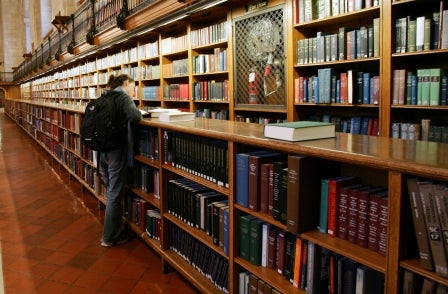
The Google Books Library Project seeks to digitise and make searchable the contents of a number of major research libraries in the US and around the world for commercial purposes.
While such a resource could be a boon for journalists carrying out research it could also present a threat to freelance journalist copyright holders in the US and UK, in the opinion of US freelance journalist Barbara Kevles.
The US Authors Guild has agreed to stay its long-running copyright infringement suit against the Library Project for alleged unauthorised scanning, distributing, and display of in-copyright books pending Google’s appeal of its class action status. Likewise, the American Society of Media Photographers’ five-year lawsuit against the Library Project over alleged copying and exhibiting of massive amounts of copyrighted images without permission is also on hold.
But another class of creators hasn’t even filed against the Library Project – American and British magazine writers. If, with a successful appeal, the Library Project goes online, freelances on both sides of the pond can kiss the copyrights to their published magazine articles goodbye together with earnings from electronic rights and updates for print or online media because magazines are hidden in the Google Books Library. Many magazines have been, in the wording of the Google database, "Digitized without authorization on or before May 5, 2009".
The Library Project is expected to carry advertising, boosting profit yet further at the $242bn company which derives 96 per cent of its income from ads – and it could do so partly at the expense of magazine copyright.
According to one veteran Washington DC attorney: “The Library Project will take away the exclusive rights to control copies, distribution, and display granted by copyright to writers.”
The library has scanned an enormous number of magazines. Yet the Google-funded Book Rights Registry, where authors claimed works or opted out of the settlement, stresses its book holdings. The 'search for a book' page asks claimants to fill in the usual – title, author, publisher, and book’s Identifier, for which Google instructs only, “10 or 13 digit ISBNs (a commercial book’s unique identifying number) are accepted.”
But identifiers for magazines – LCCNs (Library of Congress Control Numbers) or OCLCs (Online Computer Library Center numeric identifiers used by 72,000 member libraries worldwide) work, too. Either code instantly connects to Library Project files for the designated US, UK, or foreign magazines.
“It’s an over inclusive database,” says Authors Guild lead counsel, Michael Boni. He adds: “The online claim process included a searchable database that Google posted online. That database included items that don’t fit within the definition of ‘Book’ of the now rejected settlement, for example, calendars, in-store displays, schedules.…The fact that they were included in the database doesn’t mean they were in the settlement.”
The magazine inventory in the Google Book Settlement database is gigantic and it doesn’t belong there. The now rejected 2009 Amended Settlement Agreement Google worked out with The Authors Guild, Association of American Publishers, and others clearly prohibits magazines. Section 1.19 states, “The term ‘Book’ does not include: (i) Periodicals,” which section 1.104 defines as “a newspaper, magazine, … or journal and any other publication (a) that is published at a stated frequency….”
The Library Project settlement database includes magazines anyway with a twist. The settlement database lists magazines under the column heading, “Publication format,” as a “Book.” According to the Rights Registry, every issue of household names such as Good Housekeeping, Seventeen, Esquire and well known film, music and literary magazines like The Paris Review and British magazine Piano first appeared in a “Book” format.
“I attribute that to the mega data providers,” explains Kory Kennelly, Project Manager for Rust Consulting, Inc., the Google Book Settlement Administrator.
Michael Healy, executive director of the Google-funded Book Rights Registry, explains, “The Registry has about 100 bibliographic sources including Bowker, Nielson, OCLC, the Library of Congress and some libraries. Google has tried to compile a master list from these many aggregated sources. Sources have mistakes.”
Healy elaborates: “One or more data sources is telling Google an item is available as a book. The algorithm says it’s a book. Google is taking as gospel what it’s told by sources.” He stresses: “We have many sources that are wrong.”
Google declined to comment because of ongoing litigation.
US freelances have sued over four dozen electronic databases and mainstream publishers including Reed Elsevier, Inc., which operates LEXIS/NEXIS, Knight Ridder, Inc., and Time Inc. for digitised use of their articles outside the original print context. Their case, 'In Re Literary Works in Electronic Databases Copyright Litigation', has traveled from district court level in the US up to the highest court and back. Now the databases and publishers must go to trial or pay freelances for digital use of their articles with or without copyright registration. If the defendants choose to settle, a proposed $18 million settlement may be revised upwards.
US and UK freelance journalists should wake up to the threat posed to their copyright by the Google Books Library Project.
Copyright © 2013 by Barbara L. Kevles. All Rights Reserved
Barbara Kevles has worked as a freelance journalist for major magazines and newspapers for over forty years. Collections of Kevles’ journalism reside in the John F. Kennedy Library, Yale University Beinecke Rare Book and Manuscript Library, Stanford University Libraries, Museum of Modern Art (NYC), and Bryn Mawr College Special Collections. She has taught journalism at New York University, The New School (NYC), and The University of Texas at Dallas.
Email pged@pressgazette.co.uk to point out mistakes, provide story tips or send in a letter for publication on our "Letters Page" blog
